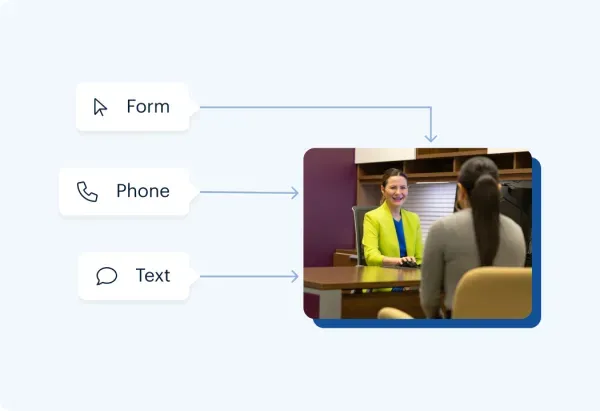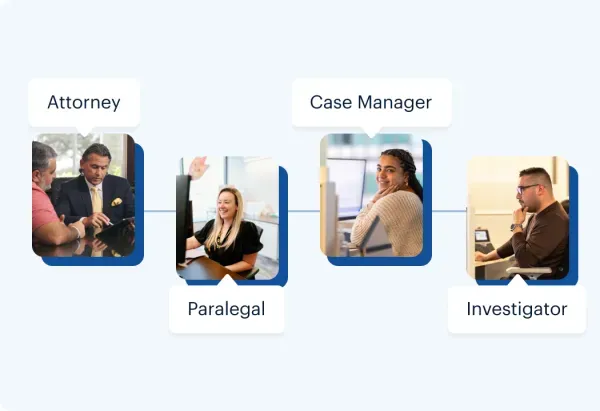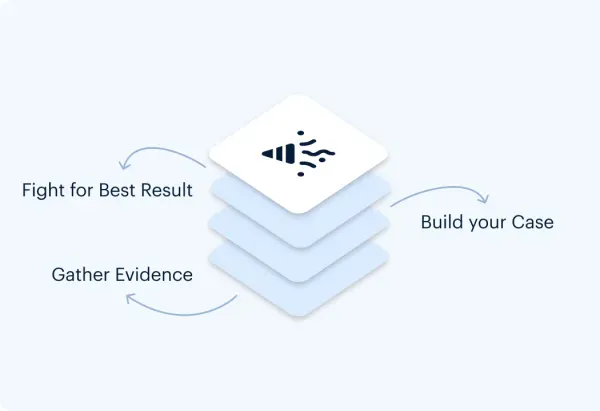Results may vary depending on your particular facts and legal circumstances. The attorney featured above is licensed in Florida. For a full list of attorneys in your state please visit our attorney page.
WHAT ARE THE RIGHTS OF EMPLOYEES IN TENNESSEE?
Work injuries can turn life upside down. We fight for injured workers to access the medical care and wage support they’re entitled to.
Results may vary depending on your particular facts and legal circumstances. The attorney featured above is licensed in Florida. For a full list of attorneys in your state please visit our attorney page.
Employee Rights in Tennessee
It’s an employee’s market out there, which has more people than ever thinking about what they want out of their work. More so than ever, employees educate themselves about a company’s culture and work environment. Unfortunately, even with extensive research and consideration, new employees can still find themselves in the midst of a difficult situation once they’re on the job.
How do you know when an employer has broken the law and when you need to advocate for yourself in a lawsuit? These are important employee rights questions to discuss with a lawyer.
Employees have access to federal and state level protections. These become most relevant when you believe that your employer has violated the laws and exposed you to unnecessary losses. Understanding Tennessee employee rights can help you gather the necessary information to meet with an experienced lawyer and to move forward with a legal claim. When an employer violates your rights, you might bring this up to them initially and give them an opportunity to fix it. But if the employer does not take your claim seriously or worse, continues the situation that caused you the problem in the first place, you might need to be prepared to consult with an experienced Tennessee employee rights attorney as soon as possible.
150,000+ Five Star Reviews
The reasons why clients trust Morgan & Morgan.
Results may vary depending on your particular facts and legal circumstances. Based on select nationwide reviews.
Our Results
How It Works
Unsure what to do next? With 35 years of experience, our personal
injury lawyers will guide you every step of the way.

Contact Us 24/7 - It’s Free
Start your claim

Meet your dedicated attorney
Meet the attorneys

We fight for more
Learn more about the case process
Results may vary depending on your particular facts and legal circumstances. The attorneys shown in these photos may not be licensed in your state. To find an attorney licensed in your area, please visit our attorney page.
Local Care
Backed by America’s Largest Injury Law Firm.
$30 Billion
Recovered for clients
nationwide700,000+
Clients and families
served1,000+
Attorneys across
the country1
Click may change your life
The attorney featured above is licensed in Florida. For a full list of attorneys in your state please visit our attorney page.
Results may vary depending on your particular facts and legal circumstances.
In the Community
Discover the local Morgan & Morgan experience with news, events, and partnerships.
Learn More
Injured and not sure what to do next?
We'll guide you through everything you need to know.
Basics of Rights
In addition to federal protections and rights available to certain employees, Tennessee also affords supplemental rights for workers in the workplace. These include promised benefits, fair payment of wages, protections from discrimination and harassment, and workers' compensation. Although these rights are not definitive, it is important to recognize that some employers could be exempted based on their jurisdiction or the company size. If you are not sure whether or not you qualify for any of these Tennessee employee rights, you need to bring your concerns and any supporting evidence to the office of an experienced employment lawyer.
If you have a claim involving even one violation of rights, that’s enough to file suit. When you have multiple violations involved, this can also be a more complex lawsuit and one that you should discuss with a dedicated attorney.
Examples of Rights for TN Employees
With the federal and state laws at play, there are many different examples of employee rights. To dig into all of them would present a great deal more information than needed, so instead, this article focuses on some of the most common violations and issues that employees might not know about when it comes to their rights. Being informed about these situations can help an employee fight back when their employer tries to break the law, but it can also help an employee file suit when necessary to protect their rights and next steps. Don’t wait to get help from an attorney when you find yourself in this situation because you’ll have a lot of unique challenges to consider and evaluate when it comes to your employee rights in Tennessee.
Understanding Breaks
Periodic breaks, such as taking time for lunch, are not mandated under federal law. However, Tennessee employees are entitled to a minimum unpaid 30-minute break if they work 6 or more consecutive hours within a shift.
Discrimination Protection
Federal mandates provide the broadest scope and protection regarding discrimination. The state mandates that every person has the right to employment regardless of age, ethnic origin, race, sex, or color. Discrimination can include things such as singling out workers, docking their wages, failing to hire them, terminating them or any other actions in the workplace in which the employee suffers as a result of discrimination. The employee is eligible to pursue legal action against the employer when it can be shown that that employer violated state or federal discrimination rules.
Family Leave
Although governed at the federal level it is important for those investigating Tennessee employee rights to understand their eligibility for family leave. The Family Medical and Leave Act is one that applies at the federal level associated with employers who have more than 50 employees. Those who have recently adopted or have new children in the family, now need to care for a sick close relative, or have experienced a devastating loss of a loved one are eligible to take unpaid leave based on a variety of factors. Certain Tennessee employees may also be entitled to supplemental benefits.
Workers' Compensation
Being hurt on the job is the cause of far too many injuries and fatalities. Tennessee employee rights protect that those who are injured on the job are entitled to the benefits provided under no-fault workers' compensation insurance coverage. Bear in mind, however, that not every employer in the state of Tennessee is obligated to carry this and they may refuse to pay out on the claim. You'll need to verify whether or not your employer is required to carry workers' compensation to begin with and ensure the facts of your case are specific.
Drug Testing
Getting a new job requires a lot of different boxes to be ticked in your pre-employment checklist. New applicants can be screened for drug testing so long as they have already been offered the position. This also requires that the applicant is made aware of the drug testing policy in advance and a certified laboratory is the only organization that can conduct these tests.
Overtime Laws
Those interested in learning more about Tennessee employee rights will also be curious about any effective overtime laws. Currently, there are no specific laws addressing overtime pay in Tennessee but federal protections can and do still apply. The United States Department of Labor Wage and Hour Division is responsible for outlining the federal laws for overtime. Federal law requires that anything greater than 40 hours worked in a single workweek is subject to a payment to the employee of one and a half times their normal pay rate. Exempted employees, however, are not eligible to receive overtime compensation and employees working on a domestic basis or living in are not required to get overtime pay. Furthermore, those professionals who make over $455 per week are exempted from overtime laws in the state.
Leave and Severance
One common question that pops up for those researching Tennessee employee rights has to do with when a person is not working or when they are terminated from their position. Currently, the state of Tennessee does not require employers to provide severance pay which is a form of payment made upon termination. Employment contracts, however, may have separate stipulations that offer you severance pay. Employers are also not responsible for providing unpaid or paid vacation time or paid sick leave. However, your employer might offer this leave as part of your employment contract and you should read it thoroughly to ensure you understand your rights.
What Happens If a Tennessee Employer Violates Employment Laws?
Tennessee employee rights come not just with an opportunity for the employee to fight back against unfair or discriminatory actions but also carry penalties. For example, failing to pay wages is known as a class B misdemeanor which can carry up to $500 fines and up to 6 months in jail for the employer. Additionally, penalties of between $500 and $1000 for each individual offense can be assessed. Misrepresenting wages in a new hire contract is a class C misdemeanor on its own with up to 30 days in jail and fines assessable as well. Finally, violating child labor laws carry stiff penalties too as employing children under the age of 14 is a class D felony. This can be punished at a fine of up to $5000 for an individual, up to $125,000 for a corporation, and up to 12 years in prison.
If you are not sure whether or not your rights have been violated and you have questions about what to do next, you need to consult with an experienced Tennessee employee rights lawyer. There are many different complicating factors involved in employment law cases and you need to have the support of an attorney who has navigated cases like this before.
How Do I Know an Employer Broke the Law?
Most employers won’t come directly out and say something, especially if they are mindful of laws in Tennessee. This means it can be hard to gather evidence when you need to fight back against someone who broke the law. You are the one who must collect material and make a compelling case about what happened and that can be very hard to do on your own. If you do have evidence of this situation, however, you should discuss it only with your lawyer. Your employer might have put forth a family friendly vibe, but that can all change when you start talking about litigation. Do not expect that your employer has your back when you accuse them of breaking the law or of questionable ethics.
In any of these circumstances, finding the right attorney is very important for evaluating your case. Contact Morgan & Morgan to receive a free, no-obligation case evaluation to take your first steps toward justice.

























